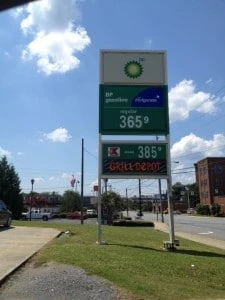 Rising gas prices are are hitting people hard in Northwest Georgia. Going to the gas station is a frustrating experience when you see that price going higher and higher every time you go to the pump. Who do we blame for this? Whose fault is it? The Rome News Tribune recently published a good article on rising gas prices but the truth is that it really does not matter. We still have to pay for it.
Rising gas prices are are hitting people hard in Northwest Georgia. Going to the gas station is a frustrating experience when you see that price going higher and higher every time you go to the pump. Who do we blame for this? Whose fault is it? The Rome News Tribune recently published a good article on rising gas prices but the truth is that it really does not matter. We still have to pay for it.
Rising gas prices will have a negative impact on Chapter 13 bankruptcy cases because gas is an absolute must. In Northwest Georgia, purchasing gas for your car is not a luxury. It is a necessity. You have to get back and forth to work. You have to drive to the grocery store to get food. When you need to go to the doctor, you must have gas for your car. The public transportation system in Rome is a joke.
When a consumer gets stuck in a situation where expenses are rising while the income is not, this will result in a situation where the Chapter 13 will no longer work. I’m afraid that rising gas costs are going to push more Chapter 13 clients into this situation. In this terrible economy, earning extra income is not a possibility for most people. As a consequence, most people have to cut out a luxury expense when the cost of a necessity increases.
My fear is that our country may enter into a period of stagflation. With stagflation, the cost of goods will continue to rise but the economy does not grow while the unemployment rate remains high. As a consumer bankruptcy attorney, I get to see a lot of paychecks in my work with bankruptcy clients. In my experience, I have not seen any sign that wages are rising. Rising gas prices hit everyone. Retailers will have to pass the costs of moving their goods on to the consumer.
When a consumer is in an active Chapter 13 case gets to the point where they can no longer afford the payment, they have four choices:
-
Voluntarily dismiss the case
-
find another source of income
-
Convert the case to a Chapter 7 bankruptcy; or
-
lower the Chapter 13 payment.
Voluntarily dismissing a Chapter 13 is the worst option. While it is true that your Chapter 13 payment stops, it is also true that you immediately lose all bankruptcy protection. Harassing phone calls and lawsuits will restart. Your car could get repossessed shortly after you dismiss your case.
Finding a new source of income is the perfect solution but in this economy it does not happen very often. It is most common when the case starts off with one spouse working and then other one later finds a job.
Converting a Chapter 13 case to a Chapter 7 can work only if you are eligible to convert. If you have filed a Chapter 7 within the last eight years, you cannot convert. Also, your income level may prevent you from converting. Your bankruptcy attorney can give you a clear analysis to see if this option is possible.
Another option is to lower the Chapter 13 payment. Again, your bankruptcy attorney will have to examine your income and budget. The questions that must be answered are whether or not there is unsecured debt that could be eliminated to lower your Chapter 13 payment. Is there enough time left in your case to lower the plan payment?
Rising gas prices can cause problems in a Chapter 13 case but there may be solutions. I’m praying that gas prices will come down soon and that our country will avoid a period of stagflation.
Other posts you might be interested in reading.
3. How much does it cost to file?
4. How do I stop a garnishment?
